Key takeaways:
- Sustainable mixology prioritizes local sourcing, organic ingredients, and waste reduction, enhancing the cocktail experience and supporting the environment.
- Implementing sustainable practices can strengthen a bar’s narrative, foster customer loyalty, and lead to financial benefits through waste reduction and community support.
- Speakeasy culture combines exclusivity with craft, emphasizing the storytelling aspect of cocktails and community connection among patrons.
- Utilizing leftover ingredients, batch-preparing cocktails, and eco-friendly garnishes are effective techniques to reduce waste in mixology.
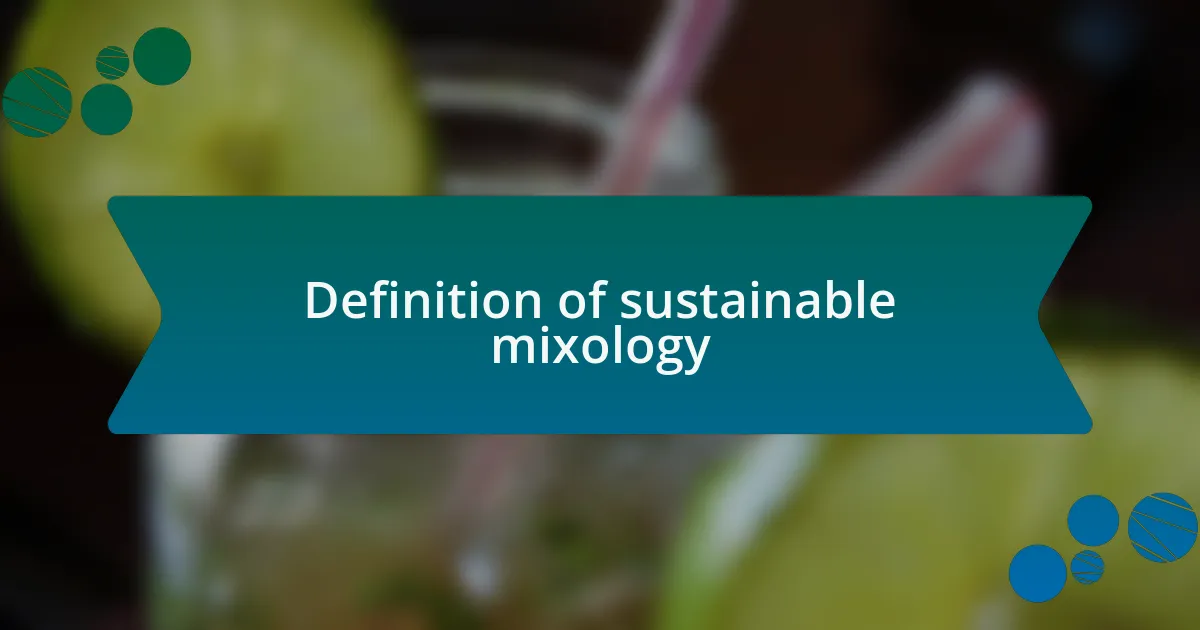
Definition of sustainable mixology
Sustainable mixology is the art of crafting cocktails while considering environmental and social impacts. It involves sourcing ingredients locally, using organic products, and prioritizing waste reduction. I often think about how my choices behind the bar can contribute to a healthier planet; it adds significant meaning to each drink I serve.
When I first learned about sustainable practices in mixology, I felt a burst of inspiration. The idea that my cocktails could support local farmers and reduce carbon footprints was eye-opening. Have you ever considered how sourcing a single herb or fruit from a nearby farm could elevate both the flavor and the story behind a drink?
At its core, sustainable mixology is about mindfulness and responsibility. Each ingredient tells a story—whether it’s a locally sourced spirit or an eco-friendly garnish. Reflecting on my experiences, I find that every sustainable choice enriches the cocktail’s narrative, making it not just a drink, but a meaningful experience for the patron.
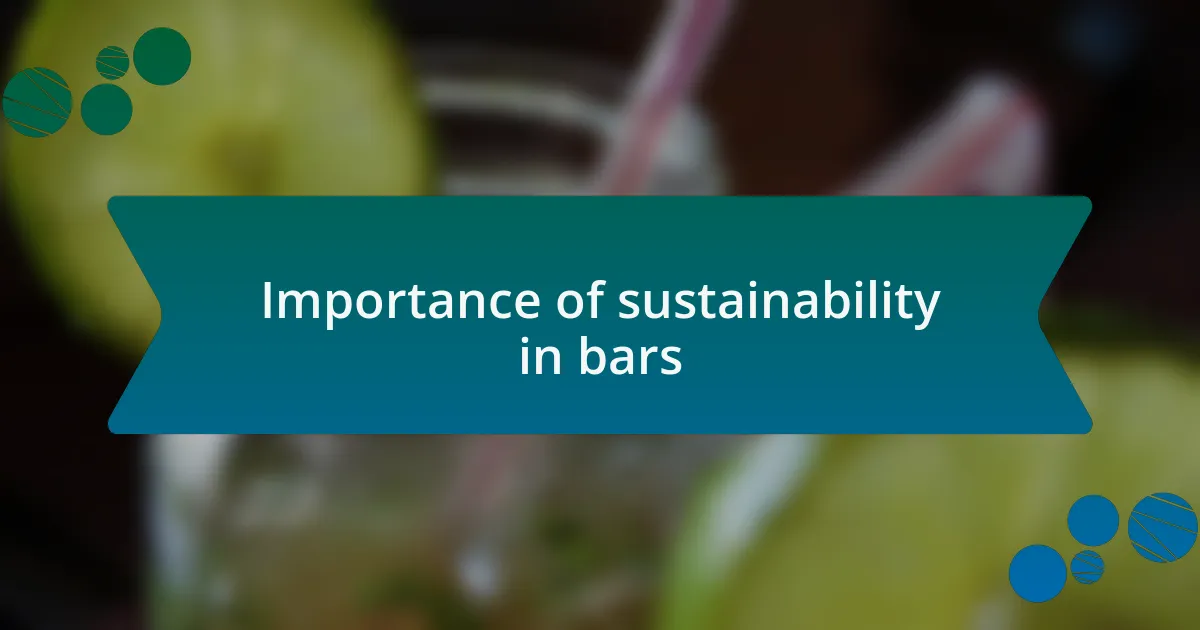
Importance of sustainability in bars
Sustainability in bars is crucial not just for the environment, but also for creating a compelling narrative that resonates with patrons. When I implemented a farm-to-table approach in my last bar, the guests responded with enthusiasm. They loved knowing that their cocktails were crafted from ingredients that supported the local community, which made each sip feel like part of a larger story.
Moreover, sustainable practices can profoundly affect a bar’s financial health. I once witnessed how reducing waste and crafting a recycling program led to significant cost savings. It struck me that sustainability isn’t just an ethical choice; it’s also a smart business strategy. Why wouldn’t I want to invest in a model that improves my bottom line while benefiting the planet?
In today’s world, consumers increasingly seek establishments that align with their values. I remember a regular customer who would choose my bar over others simply because of our sustainability initiatives. Their feedback reminded me of how impactful our choices as bar owners can be. When customers feel connected to a bar’s mission, it fosters loyalty and enhances their overall experience.
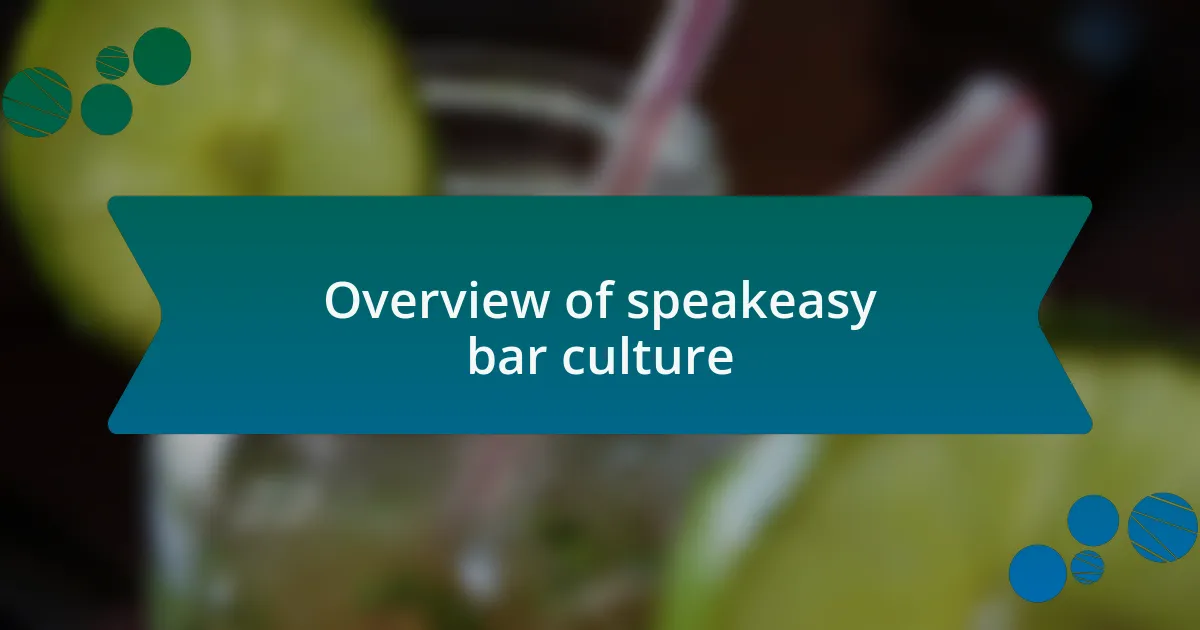
Overview of speakeasy bar culture
Speakeasy bars, with their clandestine allure, evoke a sense of nostalgia intertwined with a modern twist. I remember my first visit to a hidden speakeasy; the dim lighting and vintage decor transported me back to the Prohibition era. It’s fascinating how this culture embraces the idea of exclusivity while fostering community, making patrons feel like they’re part of something special.
The essence of speakeasy culture lies in its secretive nature. Behind unmarked doors and dimly lit corridors, the thrill of discovery enhances the drinking experience. I often wonder, isn’t there something thrilling about feeling like you’re in on a secret? Each drink becomes a conversation starter, a way to connect with fellow patrons who appreciate craft cocktails and the stories behind them.
Additionally, speakeasies place a strong emphasis on craftsmanship, showcasing the artistry of mixology. I recall a bartender at one establishment who could tell you the origin of each ingredient in your cocktail, turning a simple drink into a narrative. This deep connection to the craft invites guests to appreciate their beverages more fully, making each sip not just refreshing, but a reminder of the thoughtful labor that goes into their creation.
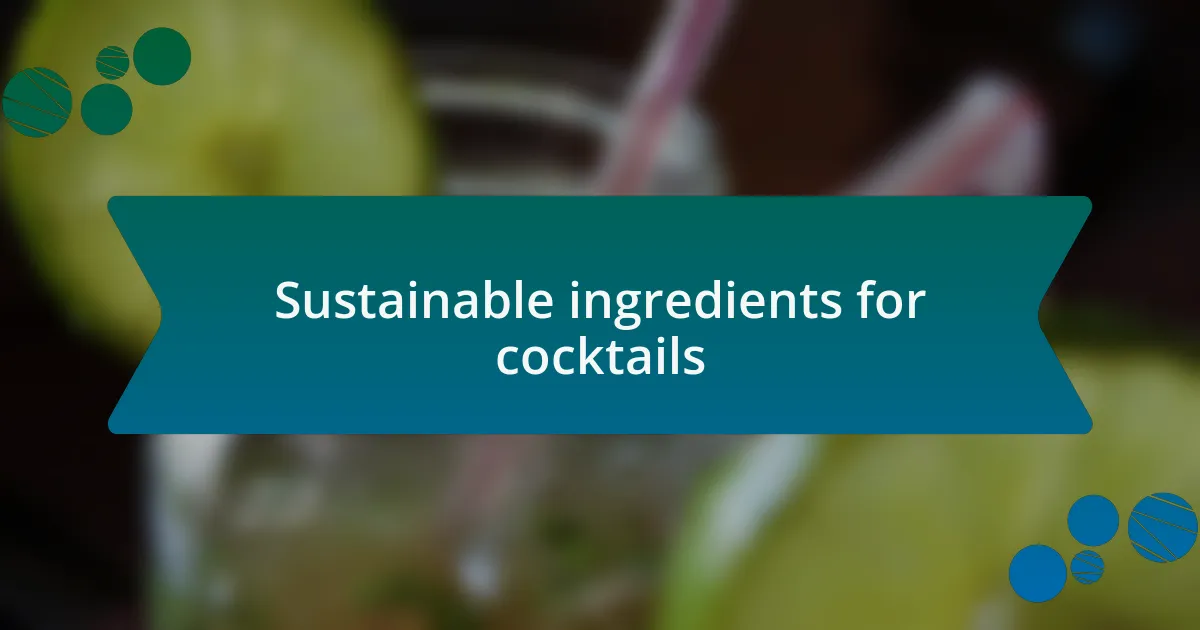
Sustainable ingredients for cocktails
When it comes to sustainable ingredients for cocktails, I find that sourcing locally can elevate not just the flavor but also the experience of enjoying a well-crafted drink. I remember visiting a farm-to-table bar where the bartender used herbs directly from the backyard garden. Each sip tasted fresher, as if the cocktail was infused with the essence of the land itself. It made me appreciate how the proximity of ingredients adds depth to the drinking experience.
Utilizing organic fruits and vegetables is another approach I deeply value. These ingredients often pack more flavor without the chemical aftertaste that can come from conventional produce. I once tried a cocktail made with organic strawberries; their sweetness was remarkable, enhancing the drink rather than overwhelming it. Isn’t it incredible how choosing organic options can lead to both personal health benefits and a significant reduction in environmental impact?
I also believe that experimenting with waste reduction can lead to unique and exciting flavor profiles. For instance, I’ve seen skilled mixologists incorporate citrus peels or leftover herbs into their drinks, reducing waste while creating stunning cocktails. This resourcefulness not only highlights the creativity behind mixology but also fosters a greater appreciation for all parts of the ingredient. Have you ever sipped a cocktail that made you rethink the way we use ingredients? It’s a revelation that can elevate your entire drinking experience.
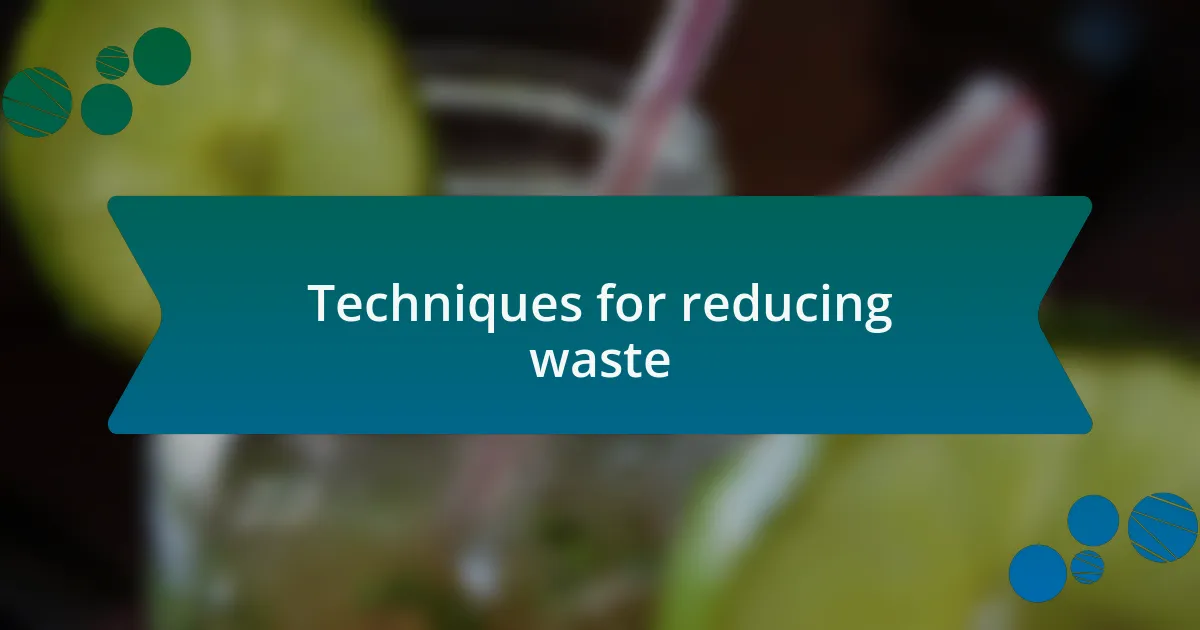
Techniques for reducing waste
One effective technique for reducing waste in mixology is repurposing leftover ingredients from other cocktails. I once encountered a bartender who took the remnants from juicing oranges for one drink and used the leftovers to craft a zesty syrup for another. The result was a delightful blend that minimized waste while bringing a new dimension of flavor. Have you ever thought about how much we throw away in a single night at the bar?
Another practice I admire is batch-preparing cocktails. By making large batches of certain drinks, bartenders use less material overall, thereby cutting down on waste. I vividly remember visiting a speakeasy where they offered a “punch of the day.” Not only did the punch utilize seasonal ingredients efficiently, but it also fostered a sense of community as patrons shared in its enjoyment. It made me think about how collective experiences can arise from a single batch of well-curated ingredients.
Also, I’ve found that utilizing eco-friendly garnishes can make a significant impact. For example, one time I visited a bar that used edible flowers and herbs grown on-site as garnishes. It struck me how beautiful and sustainable a garnish could be, serving both as an aesthetic enhancement and a conversation starter. Isn’t it fascinating how small choices can transform not just a cocktail, but our outlook on sustainability in the industry?
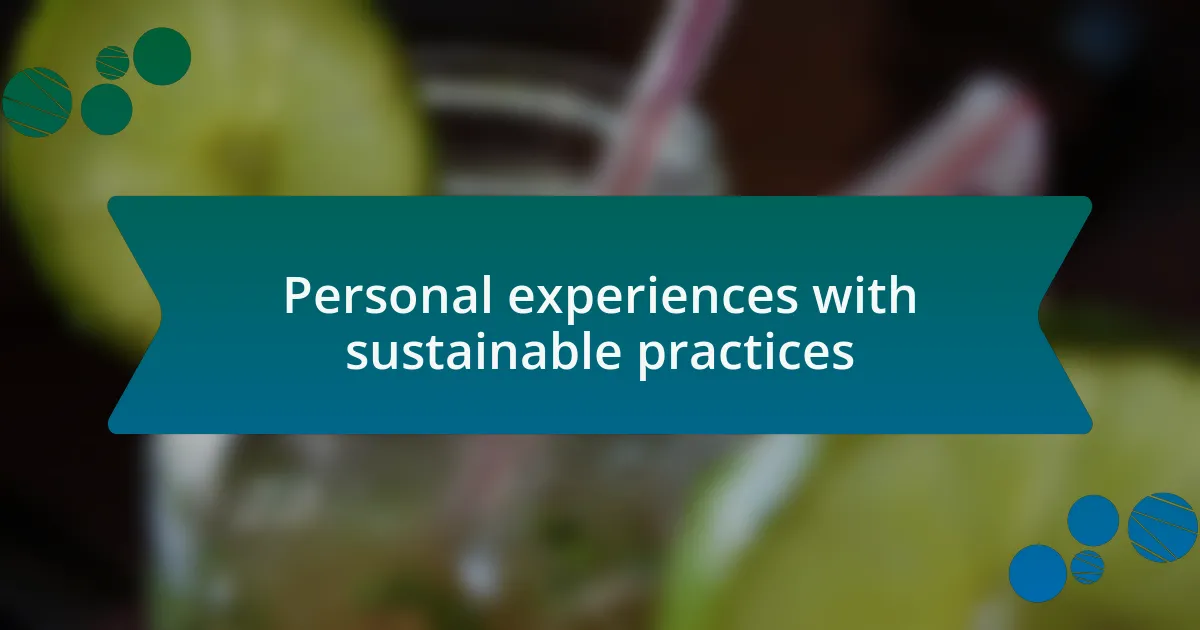
Personal experiences with sustainable practices
One evening, I stumbled upon a bar that took sustainability to heart by incorporating locally-sourced spirits. I remember the bartender sharing stories about the distilleries just a few miles away. It felt refreshing to sip on a cocktail that not only tasted incredible but also supported local businesses. Have you ever considered how community ties can enhance your drinking experience?
During my travels, I visited a cocktail lounge that featured a unique initiative: patrons could bring in their own containers for take-home cocktails. I was curious and decided to try it. The experience was not just about enjoying a exceptional drink at home; it felt empowering to participate in a practice that reduced single-use plastic. This simple act of bringing my own container highlighted how personal responsibility can make a difference in cocktail culture.
I often think back to a workshop I attended where the focus was on sustainable mixology. The way the instructors emphasized seasonal ingredients and their impact on flavor was eye-opening. I still remember crafting my own drink using herbs from the garden. It felt gratifying to connect with the ingredients on such a personal level, reminding me that sustainability isn’t just a trend—it’s a commitment we can embrace with each cocktail we create.